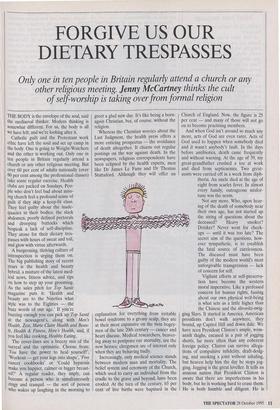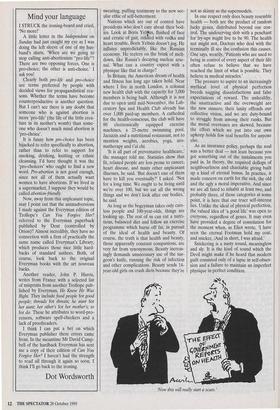FORGIVE US OUR DIETARY TRESPASSES
Only one in ten people in Britain regularly attend a church or any
other religious meeting. Jenny McCartney thinks the cult
of self-worship is taking over from formal religion
THE BODY is the envelope of the soul, said the mediaeval thinker. Modern thinking is somewhat different. For us, the body is all we have left, and we're looking after it.
Catholic guilt and the Protestant work ethic have left the soul and set up camp in the body. One is going to Weight-Watchers and the other is working out. Only one in ten people in Britain regularly attend a church or any other religious meeting. But over 60 per cent of adults nationally (over 80 per cent among the professional classes) take some regular exercise. Health clubs are packed on Sundays. Peo- ple who don't feel bad about miss- ing church feel a profound sense of guilt if they skip a keep-fit class. They feel guilty about the inade- quacies in their bodies: the slack abdomen, poorly defined pectorals and drooping buttocks which bespeak a lack of self-discipline. They atone for their dietary tres- passes with hours of sweat and toil, and glow with virtue afterwards.
A burgeoning, thriving culture of introspection is urging them on. The big publishing story of recent Years is the health and beauty hybrid, a mixture of the latest med- ical news, fitness advice, and tips on how to step up your grooming. As the sales pitch for Top Sante magazine puts it: 'Health and beauty are to the Nineties what style was to the Eighties — the buzz words of our age.' If you're buzzing enough you can pick up Top Sante at the newsagent's, along with Men's Health, Zest, Marie Claire Health and Beau- ty, Health & Fitness, Here's Health, and, if You feel like cooking, Healthy Eating.
The cover-lines are a breezy mix of the surreal and the optimistic. Choose from: `You have the power to heal yourself!', `Workout — get your legs into shape', 'Free cancer cookbooks' or 'Could hypnosis make you happier, calmer or bigger breast- ed?' A regular reader, they imply, can become a person who is simultaneously zingy and tranquil — the sort of person who wakes up laughing in the morning to greet a glad new day. It's like being a born- again Christian, but, of course, without the religion. Whereas the Christian worries about the Last Judgment, the health press offers a more enticing prospectus — the avoidance of death altogether. It churns out regular postings on the war against death. In the newspapers, religious correspondents have been eclipsed by the health experts, men like Dr James Le Fanu and Dr Thomas Stuttaford. Although they will offer an explanation for everything from irritable bowel syndrome to a greasy scalp, they are at their most expansive on the twin bogey- men of the late 20th century — cancer and heart disease. Medical researchers, beaver- ing away to postpone our mortality, are the new heroes; clergymen are of interest only when they are behaving badly.
Increasingly, only medical science stands between modern man and mortality. The belief system and ceremony of the Church, which used to carry an individual from the cradle to the grave and beyond, have been eroded. At the turn of the century, 65 per cent of live births were baptised in the Church of England. Now, the figure is 25 per cent — and many of those will not go on to become practising members.
And when God isn't around so much any more, acts of God are even rarer. Acts of God used to happen when somebody died and it wasn't anybody's fault. In the days before antibiotics, death came frequently and without warning. At the age of 39, my great-grandfather crushed a toe at work and died from septicaemia. Two great- aunts were carried off in a week from diph- theria. An uncle died at the age of eight from scarlet fever. In almost every family, outrageous misfor- tune was the norm.
Not any more. Who, upon hear- ing of the death of somebody near their own age, has not started up the string of questions about the deceased? Heavy smoker? Drinker? Never went for check- ups — until it was too late? The secret aim of the- questions, how- ever sympathetic, is to establish the fatal source of carelessness. The diseased must have been guilty of the modern world's most unforgivable transgression — lack of concern for self.
Vigilant efforts at self-preserva- tion have become the western moral imperative. Like a professed concern for human rights, fussing about our own physical well-being is what sets us a little higher than the Chinese and the slivovitz-swig- ging Slays. It started in America. American presidents don't walk anywhere, they bound, up Capitol Hill and down dale. We have seen President Clinton's ample, wom- anish thighs, encased in a pair of jogging shorts, far more often than any coherent foreign policy. Clinton can survive allega- tions of compulsive infidelity, draft-dodg- ing, and smoking a joint without inhaling, but heaven help him the day he stops jog- ging. Jogging is the great leveller. It tells an anxious nation that President Clinton is aware that there are imperfections in his body, but he is working hard to erase them. He is both humble and diligent. He is sweating, puffing testimony to the new sec- ular ethic of self-betterment.
Nations which are out of control have presidents who don't care about their bod- ies. Look at Boris Yeltin, flushed of face and erratic of gait, riddled with vodka and heart trouble. Boris Yeltsin doesn't jog. He inflates unpredictably, like the Russian economy. He teeters on the brink of melt- down, like Russia's decaying nuclear arse- nal. What can a country expect with a physique like that in charge?
In Britain, the American dream of health and fitness has long ago taken hold. Near where I live in north London, a colossal new health club with the capacity for 3,000 members is being built. Although it is not due to open until mid-November, the Lab- oratory Spa and Health Club already has over 1,000 paid-up members. A cathedral for the health-conscious, the club will have 80 electronically equipped exercise machines, a 25-metre swimming pool, Jacuzzis and a nutritional restaurant, not to mention weights, aerobics, yoga, aro- matherapy and t'ai chi.
`It is all part of preventative healthcare,' the manager told me. Statistics show that fit, relaxed people are less prone to cancer, heart disease, and many other unpleasant illnesses, he said. 'But doesn't one of them have to kill you eventually?' I asked. 'Not for a long time. We ought to be living until we're over 100, but we eat all the wrong things and we don't look after our bodies,' he said.
As long as the bogeyman takes only care- less people and 100-year-olds, things, are looking up. The rest of us can eat a nutri- tious, balanced diet and follow an exercise programme which burns off fat, in pursuit of the ideal of health and beauty. Of course, the truth is that health and beauty, those apparently constant companions, are very far from synonymous. Beauty increas- ingly demands unnecessary use of the sur- geon's knife, running the risk of infection and other complications. Beauty sends 14- year-old girls on crash diets because they're not as skinny as the supermodels.
In one respect only does beauty resemble health — both are the product of random lucky genes, distributed beyond our con- trol. The undeserving slob with a penchant for fry-ups might live to be 90. The health nut might not. Doctors who deal with the terminally ill see the confusion this causes. One says, wearily, 'Patients who are used to being in control of every aspect of their life often refuse to believe that we have reached the limit of what is possible. They believe in medical miracles.'
The pressure to aspire to an increasingly mythical level of physical perfection breeds nagging dissatisfactions and false expectations of reward. The unhealthy, the unattractive and the overweight are the new sinners; their laxity offends our collective vision, and we are duty-bound to struggle from among their ranks. But the moral overtones are skewed, because the effort which we put into our own upkeep holds few real benefits for anyone else.
As an insurance policy, perhaps the soul was a better deal — not least because you got something out of the instalments you paid in. In theory, the required dollops of neighbourliness and charitable giving built up a kind of eternal bonus. In practice, it made concern on earth for the sick, the old and the ugly a moral imperative. And since we are all fated to inhabit at least two, and probably three, of those categories at some point, it is here that our truer self-interest lies. Unlike the ideal of physical perfection, the valued idea of 'a good life' was open to everyone, regardless of genes. It may even have provided a degree of consolation for the moment when, as Eliot wrote, 'I have seen the eternal Footman hold my coat, and snicker, /And in short, I was afraid.'
Snickering is a nasty sound, meaningless and sly. It is the kind of sound which the Devil might make if he heard that modern guilt consisted only of a lapse in self-obses- sion and a failure to maintain an imperfect physique in perfect condition.
Now this will really start a scare.'



































































 Previous page
Previous page